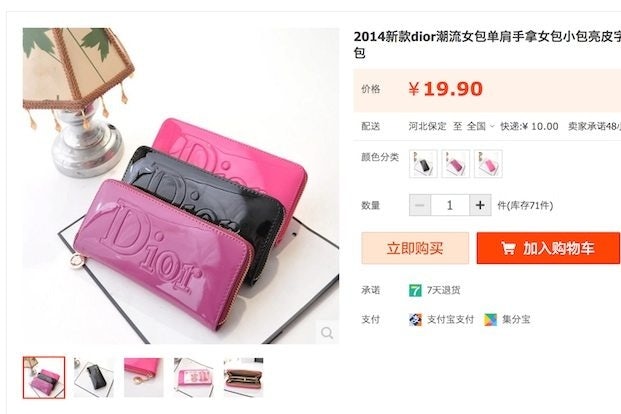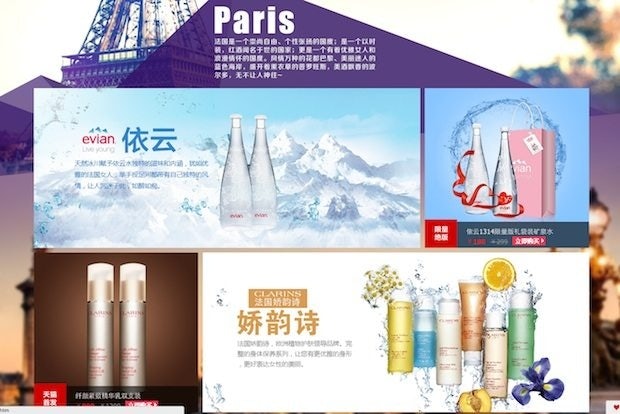
"Dior" wallets for sale on Taobao.
It’s official: after months of anticipation, Alibaba is set to hit the market with its U.S. IPO after a two-week global tour to pitch the stock. In order to gear up for the major new milestone in the company's history, it has been fervently trying to do away with the reputation that its e-tail sites Tmall and Taobao are hotbeds for fake and gray-market luxury goods. The company faces an uphill battle, however—meaning that luxury brands shouldn’t expect a quick revolution when it comes to taming China’s behemoth fake goods market.
On Friday, Alibaba set a price range that values the company at around $155 billion, and is embarking on a two-week campaign to pitch the stock to potential investors. The stock is expected to be priced on the night of September 18 and start trading the next day with the symbol “BABA,” according to The Wall Street Journal.
As the e-commerce giant has built up to this moment, it has made great strides to demonstrate a dedication to eradicating the scourge of fake luxury items that have been big sellers on Taobao and even Tmall in order to build up its legitimacy in the eyes of foreign investors. For example, in May, it announced that it had streamlined the process by which its sites remove counterfeit goods.
In addition, the company has been working with governments and business organizations from countries known for their massive concentration of luxury goods to show that it’s ready to stamp out fakes. Most recently, it signed an agreement with the China-Britain Business Council stating that it would work to crack down on fake British goods and will make it easier for council members to report copyright infringements to the site. In May, it inked a deal with France’s government to promote French brands and fight counterfeits, and did the same with the Italian government in June.

A special French brands promotion sponsored by Tmall after Alibaba's agreement with the French government.
Alibaba has also been working directly with brands to fight fakes. Last year, it signed an agreement with top global luxury conglomerate LVMH to cut down on counterfeit goods rampant on the sites.
These efforts haven’t led to completely smooth sailing, however. This July, Alibaba was slapped with a lawsuit by main LVMH competitor Kering, which alleged that Alibaba was actively assisting known sellers of counterfeit items, such as one company that sold fake $2 to $5 Gucci logo-emblazoned diaper bags that was granted “Gold Supplier and Assessed Supplier status” by Alibaba. Alibaba’s concerns over its image before the IPO led to a quick dialogue and agreement with Kering, which withdrew its lawsuit in August.
This controversy highlights the fact that while these anti-fake efforts are in the interests of foreign investors, they aren’t necessarily in the short-term interests of the company in terms of profits. According to a recent Business of Fashion op-ed by executives from China fashion site Bomoda, the sale of fakes and unauthorized goods “constitutes the vast majority” of Alibaba’s luxury business. This is due in large part to high demand for cheaper goods caused by tariffs that create massive markups of real, authorized luxury items sold in China. As a result, many Chinese consumers head online to buy fakes or daigou goods on Taobao or Tmall at substantially lower prices. As long as massive demand remains, it will be difficult and costly for Alibaba to gain a hold on the situation.
The most effective way for brands to get counterfeits off Alibaba’s e-commerce sites currently appears to be an “if you can’t beat them, join them” approach. When Burberry became the first major global luxury fashion brand to launch a Tmall shop earlier this spring, researches at L2 Think Tank found that virtually all gray-market items were removed from the platform. Most luxury brands, however, are still wary of diluting their brand image by joining the site. More real luxury brand shops on Tmall would provide a financial incentive to Alibaba to crack down harder on fakes—even if the sales volume may still end up being much smaller, the legitimacy may pay off with investors.
Even if Alibaba manages to completely clean up its act, China’s counterfeit goods market is going to remain alive and well as long as tariffs remain high and enforcement of copyright protection remains low. While Taobao and Tmall are China’s largest e-commerce platforms right now, consumers in search of gray-market goods will head to other outlets such as the country’s many brick-and-mortar markets with fakes or WeChat sellers, which are becoming increasingly popular.